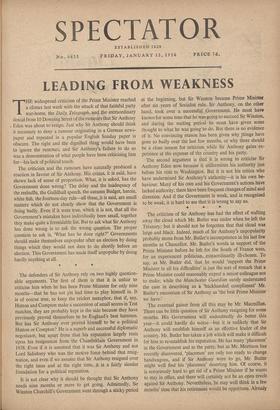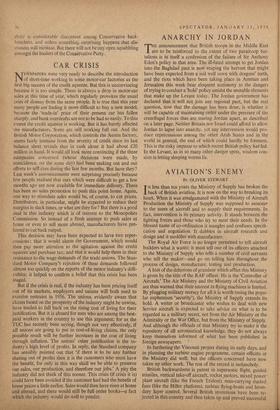LEADING FROM WEAKNESS
THE widespread criticism of the Prime Minister reached a climax last week with the attack of that faithful party war-horse, the Daily Telegraph, and the extraordinary denial ftom 10 Downing Street of the rumours that Sir Anthony . Eden was about to resign. Just why Sir Anthony should think it necessary to deny-a rumour originating in a German news- paper and repeated in a popular English Sunday paper is obscure. The right and the dignified thing would have been to ignore the rumours, and Sir Anthony's failure to do so was a demonstration of what people have been criticising him for—his lack of political touch.
The criticism and the rumours have naturally produced a reaction in favour of Sir Anthony. His critics, it is said, have shown lack of sense of proportion. What, it is asked, has the Government done wrong? The delay and the inadequacy of the reshuffle, the Guildhall speech, the autumn Budget, heroin, white fish, the fourteen-day rule—all these„it is said, are small matters which do not clearly show that the Government is doing badly. Even if it were true, which it is not, that all the Government's mistakes have individually been small, together they make quite a formidable list. But to ask what Sir Anthony has done wrong is to ask the wrong question. The proper question to ask is, 'What has he done right?' Governments should make themselves unpopular after an election by doing things which they would not dare to do shortly before an election. This Government has made itself unpopular by doing hardly anything at all.
* * * The defenders of Sir Anthony rely on two highly question- able arguments. The first of them is that it is unfair to criticise him when he has been Prime Minister for only nine months—that he has not yet had time to play himself in. It is of course true, to keep the 'cricket metaphor, that if, say, Hutton and Compton make B. succession of small scores in Test matches, they are probably kept in the side because they have previously proved themselves to be England's best batsmen. But has Sir Anthony ever proved himself to be a political Hutton or Compton? He is a superb and successful diplomatic negotiator, but apart from that his reputation largely rests upon his resignation from the Chamberlain Government in 1938. Even if it is assumed that it was Sir Anthony and not Lord Salisbury who was the motive force behind that resig- nation, and even if we assume that Sir Anthony resigned over the right issue and at the right time, it is a fairly slender foundation for a political reputation.
It is not clear . why it should be thought that Sir Anthony needs nine months or more to get going. Admittedly, Sir Winston Churchill's Government went through a sticky period at the beginning, but Sir Winston became Prime Minister after six years of Socialist rule. Sir Anthony, on the other hand, took over a successful ,Government. He must have known for some time that he was going to succeed Sir, Winston, and during the waiting period he must have given some thought to what he was going to do. But there is no evidence of it. No convincing reason has been given why things have gone so badly over the last few months, or why there should be a close season for criticism while Sir Anthony gains ex- perience at the expense of the country and his party.
The second argument is that it is wrong to criticise Sir Anthony Eden now because it undermines his authority just before his visit to Washington. But it is not his critics who have undermined Sir Anthony's authority—it is his own be- haviour. Many of his own and his Government's actions have lacked authority; there have been frequent changes of mind and direction. And if the Government is weak, and is recognised to be weak, it is hard to see that it is wrong to say so.
The, criticism of Sir Anthony has had the effect of wafting away the cloud which Mr. Butler was under when he left the Treasury; but it should not be forgotten that that cloud was large and black. Indeed, much of Sir Anthony's unpopularity probably stems from Mr. Butler's incompetence in his last few months as Chancellor. Mr. Butler's words in support of the Prime Minister before he left for the South of France were, for an experienced politician, extraordinarily ill-chosen. To say, as Mr. Butler did, that he would 'support the Prime Minister in all his difficulties' is just the sort of remark that a Prime Minister could reasonably expect a senior colleague not to make; while the Manchester Guardian surely understated the case in describing as a 'backhanded compliment' Mr. Butler's encomium of Sir Anthony as 'the best Prime Minister we have.'
The eventual gainer from all this may be Mr. Macmillan. There can be little question of Sir Anthony resigning for some months. His Government will undoubtedly do better this year—it could hardly do worse—but it is unlikely that Sir Anthony will establish himself as an effective leader of the country. Mr. Butler has taken a job which will make it difficult for him to re-establish his reputation. He has many `placemen' in the Government and in the party, but as Mr. Morrison has recently discovered, `placemen' are only too ready to change bandwagons, and if Sir Anthony were to go, Mr. Butler might well find his `placemen' deserting him. Of course, it is notoriously hard to get rid of a Prime Minister if he wants to stay in office, and there will certainly not be an open revolt against Sir Anthony. Nevertheless, he may well think in a few months' time that his retirement would be opportune. Already there is considerable discontent among Conservative back- honchers, and unless something. surprising happens, that dis- content will increase. But there will not be any open squabbling amongst the leaders of the Conservative Party.



































 Previous page
Previous page